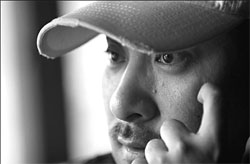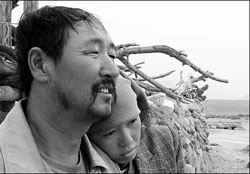Dancing with the stars
Golden Bear-award winning director Wang Quan'an believes in telling a good story. |
Wang's reputation has soared since he won the Golden Bear award, the top prize at the Berlin Film Festival in February, for his third film, Tuya's Marriage (Tuya De Hunshi). This came precisely 20 years after director Zhang Yimou, who hails from the same part of Northwestern China as Wang, won the same prize with Red Sorghum (Hong Gaoliang).
Wang's path to filmmaking has been anything but ordinary.
Born in 1965 in Yan'an, Shaanxi Province, he was plucked out of regular school at age 12 to train as a ballet dancer for a local troupe. Over the next seven years, he toured the world with the ensemble, performing abroad and leading what seemed like an adventurous
Wang Quan'an and Yu Nan in Xin'an after Tuya's Marriage bagged the Golden Bear in February. |
Then came the first of the string of serendipitous happenings that would set Wang in new direction.
Performing in Paris in 1983, he fell in love with a French girl who worked as an interpreter for an art troupe from the former Soviet Union.
One day, his girlfriend took him to visit a church that had served as a location for the French film The Old Gun, a thriller set in World War II.
By the last rays of the setting sun, she related the film's story, and the kernel of a new career was born.
"Everything was just so beautiful," Wang recalled. "I had an idea: Why not make a film myself?"
He applied to film schools in France, but when one in Lyon accepted him, he hesitated. If he stayed in France, what would he shoot?
"Troublemaker" film academy student Yu Nan plays the lead female role in Tuya's Marriage . |
So Wang said au revoir to France, and to his young love.
Instead, he applied to the Beijing Film Academy, gaining admission to study acting, which required lower academic scores than the directing program.
Entering in 1987, he quickly began causing headaches for the school. Assigned to be monitor for his class, he resigned because he did not like the part about snitching on other students. He also skipped required classes, devoting most of his time to writing scripts.
"I'd seen so much of the world when I was young," Wang said, "that textbook learning no longer satisfied me."
The next key moment came at the end of one semester, when he was supposed to act out a short drama selected from existing works. Instead, he presented a play he had written himself, telling his classmates the script was by some well-known author.
It was a tearjerker of a love story. And the audience succumbed. All the crying gave Wang confidence that indeed he had the ability to tell a good story.
Now, he was convinced he wanted to be a director but he was in no hurry.
Upon graduation, while many of his classmates began shooting films immediately or sought opportunities abroad, Wang took his time and continued writing scripts.
"My favorite directors, like Akira Kurosawa or Francis Ford Coppola, are all masters at writing scripts, because that's important training for a director," he said. "Coppola might spend 10 years on one script. Maybe I won't take 10 years, but I'll write 10 scripts."
After spending the rest of the 1990s working at the Xi'an Film Studio in his home province, acting occasionally in films or TV dramas but mainly writing one screenplay after another, he finally felt ready.
So in 2000, he returned to Beijing to explore opportunities for getting his stories on to the screen. Attending a party one evening, he went outside to smoke by the gate. Another man was doing the same. Glancing at each other, they knew both of them were not really party-goers. This marked another key moment. As Wang recalls, the other man struck up a conversation by asking: "Can films make money nowadays?"
"Hardly," Wang replied.
"Can good films make money?" the man asked.
"Hard to say, but good films are more likely to make money," Wang said.
At that, the man said: "If you want to make a film, call me."
He gave Wang his phone number, and nearly a year later Wang did call him.
They met up again at the Beijing Film Academy. The man turned out to be a real estate magnate, who had been helped by others in the past and thus resolved to pass on help once he had the money to do so.
Without even reading Wang's scripts, he offered the director-to-be 6 million yuan ($760,000). Wang said he would accept 4 million ($510,000).
"From my first film, I understood clearly that what counts in a film is not the amount of financial investment, but quality," Wang said.
Wang's discovery of Yu Nan, his leading lady, was the next twist in his career path. As Wang was searching for an actress in the corridors of the Beijing Film Academy, he overheard a young woman arguing with her teacher.
It turned out that, like Wang, she was cutting classes. Her objective was to watch all kinds of films, especially those of Ingmar Bergman.
Coming upon what turned out to be a routine fight between the teacher and her most difficult student, Wang interrupted to ask whether Yu might star in his film. The teacher warned him saying: "Not this one, she's a big troublemaker."
Wang's response: "I need a troublemaker!"
The two kindred spirits first worked together on Wang's Lunar Eclipse (Yue Shi), for which Yu won a Best Actress award at the 2001 Deauville Film Festival.
She went on to lead in the next two works as well The Story of Ermei (Jing Zhe), released in 2004, and the prize-winning Tuya's Marriage completed in 2006.
Wang's movies revolve around strong female characters. He said female roles appealed to him because he considered women to be more resilient and straightforward than men. His next project, he said, was about a group of female textile factory workers in contemporary China.
His ultimate aim is to make films that play equally well in art houses and big mainstream theaters.
"The big film I dream of," Wang said, "would be like The Godfather: combining art and commercial value perfectly and powerfully."
(China Daily 04/06/2007 page20)

















